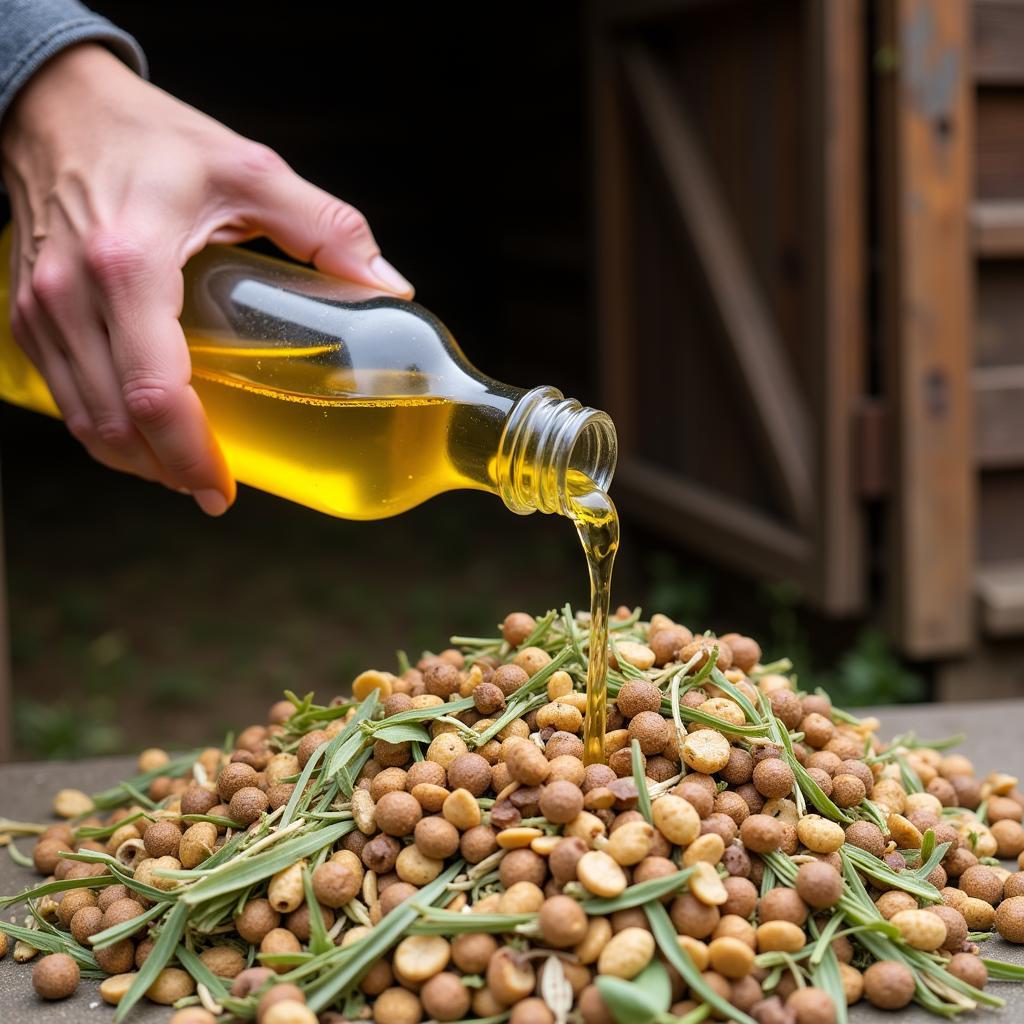Rice oil is gaining traction as a potential supplement for horses, promising a boost in energy and a shiny coat. But is it all it’s cracked up to be? This article delves into the benefits, risks, and best practices for using Rice Oil For Horses, helping you make an informed decision for your equine companion.
Understanding the Allure of Rice Oil for Horses
Rice oil is a vegetable oil extracted from rice bran. Its high fat content makes it a calorie-dense option, potentially beneficial for horses needing to gain or maintain weight. It’s also rich in gamma-oryzanol, an antioxidant that some believe can improve muscle function and stamina. Furthermore, rice oil is often touted for its ability to enhance coat shine and overall skin health. However, it’s crucial to examine these claims critically and understand the potential downsides before incorporating rice oil into your horse’s diet.
Potential Benefits of Rice Oil
Many horse owners are drawn to rice oil for its perceived benefits. Let’s break down some of the commonly cited advantages:
- Increased Energy: The high fat content in rice oil provides a concentrated source of calories, which can translate to increased energy levels, especially for horses in intense training or those struggling to maintain weight.
- Improved Coat Condition: Rice oil is rich in essential fatty acids, which contribute to a healthy, shiny coat. This can be particularly appealing for show horses or those with dull, dry coats.
- Potential Antioxidant Benefits: The presence of gamma-oryzanol, an antioxidant, has led some to believe that rice oil can help protect cells from damage and improve muscle function. However, more research is needed to confirm these effects in horses.
- Calming Effect: Some horse owners report a calming effect after adding rice oil to their horse’s diet. This could be attributed to the increased energy providing a sense of well-being, or potentially to the impact of fatty acids on brain function.
 Pouring Rice Oil on Horse Feed
Pouring Rice Oil on Horse Feed
Risks and Considerations When Using Rice Oil
While rice oil offers potential benefits, it’s crucial to be aware of the potential risks and use it with caution:
- Weight Gain: The high calorie content of rice oil can lead to unwanted weight gain if not carefully managed. This is particularly concerning for horses prone to obesity or metabolic issues.
- Digestive Upset: Introducing rice oil too quickly or in large quantities can cause digestive problems like diarrhea or loose stools. It’s essential to start with small amounts and gradually increase the dosage.
- Nutrient Imbalance: Relying solely on rice oil for increased calories can lead to nutrient imbalances if not combined with a balanced diet.
- Vitamin E Deficiency: Rice oil can interfere with Vitamin E absorption, so supplementing with Vitamin E may be necessary.
Is Rice Oil Right for Your Horse?
Deciding whether to incorporate rice oil into your horse’s diet should be done in consultation with a veterinarian or equine nutritionist. They can assess your horse’s individual needs, consider any existing health conditions, and help determine the appropriate dosage and usage.
 Veterinarian Examining a Horse
Veterinarian Examining a Horse
Best Practices for Using Rice Oil
If you decide to use rice oil, follow these best practices:
- Start Slowly: Introduce rice oil gradually, starting with a small amount and increasing slowly over several weeks.
- Monitor Weight and Condition: Regularly monitor your horse’s weight and body condition to ensure they are not gaining excessive weight.
- Consult a Professional: Seek guidance from a veterinarian or equine nutritionist for personalized recommendations on dosage and usage.
- Choose High-Quality Oil: Opt for high-quality, cold-pressed rice oil specifically formulated for horses.
- Store Properly: Store rice oil in a cool, dark place to prevent oxidation.
Conclusion: Making an Informed Decision About Rice Oil for Horses
Rice oil can be a valuable addition to a horse’s diet when used correctly. However, it’s crucial to understand the potential benefits and risks, and always consult with a professional before making any changes to your horse’s feeding regimen. By following best practices and working with your veterinarian, you can ensure that rice oil contributes positively to your horse’s overall health and well-being.
 Healthy Horse with a Shiny Coat
Healthy Horse with a Shiny Coat
FAQ
-
Can I give rice oil to my pregnant mare? Consult your veterinarian before giving any supplements to a pregnant mare.
-
How much rice oil should I give my horse? The appropriate dosage varies depending on the horse’s individual needs. Consult a veterinarian or equine nutritionist for personalized recommendations.
-
What are the signs of digestive upset in horses? Signs include diarrhea, loose stools, colic, and loss of appetite.
-
Can rice oil replace other fat sources in my horse’s diet? It’s best to discuss any dietary changes with a veterinarian or equine nutritionist before making substitutions.
-
Where can I buy rice oil for horses? High-quality rice oil can be found at feed stores, online retailers, and some veterinary clinics.
Common Scenarios and Questions
-
Scenario: My horse is a hard keeper and struggles to maintain weight. Question: Can rice oil help my horse gain weight?
-
Scenario: My horse has a dull, dry coat. Question: Will rice oil improve my horse’s coat condition?
-
Scenario: My horse is prone to digestive upset. Question: Is rice oil safe for horses with sensitive stomachs?
Further Reading
You may find these other articles on our website helpful:
- Equine Nutrition Basics
- Understanding Horse Supplements
- Caring for a Senior Horse
Need help? Contact us: Phone: 0772127271, Email: [email protected] Or visit us at: QGM2+WX2, Vị Trung, Vị Thuỷ, Hậu Giang, Việt Nam. We have a 24/7 customer support team.